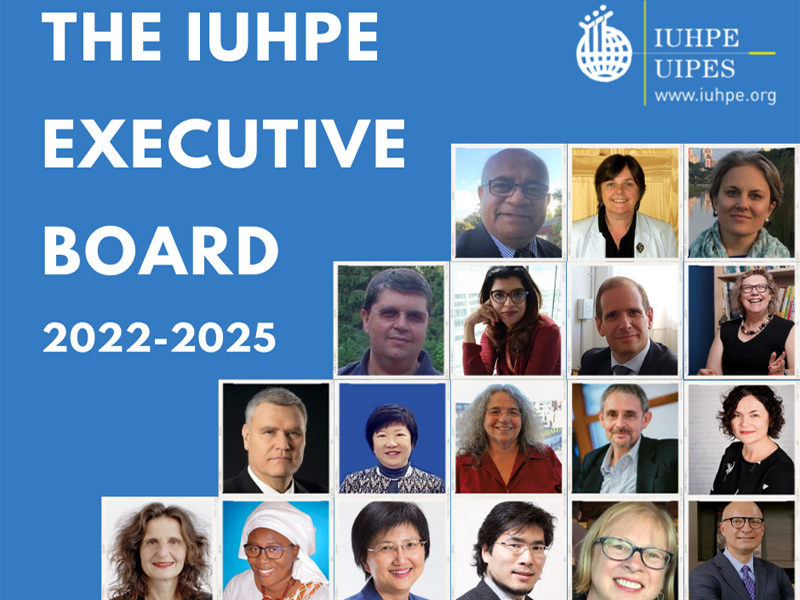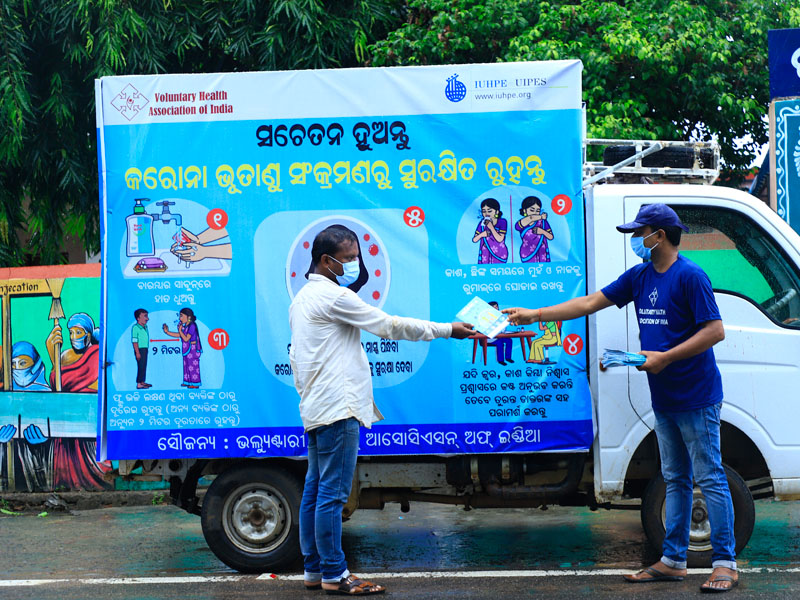The major cause of disease burden and premature deaths among countries in the South-East Asia Region (SEAR) are communicable and non-communicable diseases as well as the new emerging threats such as COVID-19. Tuberculosis, malaria & HIV/AIDs remain a major public health concern, while non-communicable diseases such as diabetes, cardiovascular diseases and cancers are increasing even among the poor. Furthermore, due to rapid globalization, the countries in the region are experiencing drastic changes in consumption patterns of food, tobacco and alcohol. Added to these are the huge disparities between and within the countries. As all of us know, Health Promotion is a sustainable strategy to address the underlying causes of the growing disease burden and to reduce premature mortality as well as inequalities.
Voluntary Health Association of India(VHAI) and the International Union for Health Promotion and Education (IUHPE) have collaborated to systematically expand IUHPE’s Health Promotion agenda in the South East Asia Region(SEAR). The International Post of IUHPE for the SEAR is based at VHAI, New Delhi to carry out collaborative work in the region with specific objectives:
- Leveraging existing networks to:
- Facilitate the exchange of knowledge on health promotion and specific topics such as non-communicable diseases and horizontal integration of like-minded organizations within the South East Asia region.
- Liaise with other actors who are proactively working on Health promotion in the region.
- Formation of an IUHPE Regional Committee with key representatives from various countries of the region
- Carry out a feasibility study, with instrumental support from the IUHPE International Secretariat, outlining best practices in health promotion as well as existing resources and capacity within the South East Asia countries, and proposing training and intervention packages to further strengthen the capacity.
Global Executive Board
 Ms. Bhavna Mukhopadhyay, Chief Executive, VHAI has been elected to the Executive Board of IUHPE 2022-2025. The Executive Board governs and administers the IUHPE on behalf of the General Assembly. The board determines policies, strategies and integrated work programmes for the Organisation. The board is responsible for reviewing and approving triennial integrated Work Plan, financial budgets and approving Global and Regional Bye-Laws along with other administrative roles.
Ms. Bhavna Mukhopadhyay, Chief Executive, VHAI has been elected to the Executive Board of IUHPE 2022-2025. The Executive Board governs and administers the IUHPE on behalf of the General Assembly. The board determines policies, strategies and integrated work programmes for the Organisation. The board is responsible for reviewing and approving triennial integrated Work Plan, financial budgets and approving Global and Regional Bye-Laws along with other administrative roles.
Other members of the board include:
Global Executive Board:
- Ann Pederson (Vancouver)
- Claudia Meier Magistretti (Bern)
- Didier Jourdan (Clermont-Ferrand)
- Angela Leung (Hong Kong)
- Evelyne de Leeuw (Sydney)
- José Luis Castro (New York)
- Louise Potvin (Montréal)
- Bhavna Mukhopadhyay (New Delhi)
- Louise Baldwin (Brisbane)
- Shu-Ti Chiou (Taipei)
- Rosalie Aduayi Diop (Dakar)
- Stephan Van den Broucke (Louvain-la-Neuve)
To learn more, please visit https://www.iuhpe.org/index.php/en/governance-structure/executive-board
Key activities of the year 2020-21
In the context of the reality within SEAR, VHAI-IUHPE has formed a Regional Advisory Committee. The committee have representatives from various countries of the region who have a deep understanding and experience on Health Promotion. The main role of the Advisory Committee is to guide, foster, and evolve potential partnerships within the South East Asia to take this important public health agenda forward.
The first meeting of the Regional Advisory Committee was held virtually on 9th February 2020 with active participation from Malaysia, Nepal, Sri Lanka, India and colleagues from IUHPE (Canada). The main purpose of the meeting was to introduce IUHPE-VHAI collaboration to expand their health promotion agenda in the South-East Asia region as well as to get valuable insights from the members on health promotion priorities of the countries & bringing a health promotion perspective to COVID-19 response in the region.
Publications
Redefining health promotion to reach the unreached: opportunities for transformative change in South and South-East Asia
Paper by Alok Mukhopadhyay & Nancepreet Kaur
Abstract
The pandemic has exposed the vulnerability of our civilization and reinforced the importance of living in harmony with nature, not rampaging it in a conquering mode. South and South-East Asia have a vital role to play in achieving the global goal of ‘Health for All’ as the regions have a significantly large share of global income and multidimensional poor compared to other regions. Clearly, the progress in health and development outcomes of these regions cannot be achieved without addressing social determinants of health and ensuring active public participation. These regions must collectively address the social determinants of health following a realistic health promotion model. It is indeed a favourable time to look beyond the so-called predominantly reductionist biomedical model of health care to a more holistic model of health, that places humans and the environment at the centre, and emphasizes the importance of promoting health and wellbeing.

